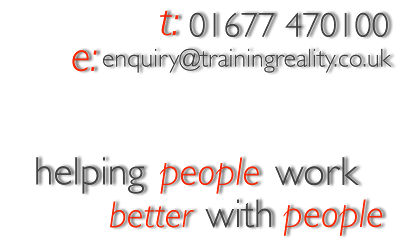Please press (at least!) one of these.
It costs you nothing, and (possibly) helps us spread the word!
Real, open-minded, learning
Wednesday, 17 March 2010
There are a million and one ways to learn, as an individual, a team, or an organisation, and training is one of those. The underlying principles of how to learn, how to develop, and grow rarely change, but it’s wonderful when a new, genuine, and non-gimmicky learning tool comes along. I learnt about a new one recently.
I’m now going to unashamedly quote from this wonderful, innovative, learning tool:
The Human Library is an innovative method designed to promote dialogue, reduce prejudices and encourage understanding. The main characteristics of the project are to be found in its simplicity and positive approach.
In it’s initial form the Human Library is a mobile library set up as a space for dialogue and interaction. Visitors to the Human Library are given the opportunity to speak informally with "people on loan"; this latter group being extremely varied in age, sex and cultural background.
The Human Library enables groups to break stereotypes by challenging the most common prejudices in a positive and humorous manner. It is a concrete, easily transferable and affordable way of promoting tolerance and understanding.
It is a "keep it simple", "no-nonsense" contribution to social cohesion in multicultural societies.
I’d highly recommend learning more about the Human Library – take a look here later.
I’d like to use this opportunity to explore two very simple aspects of learning that occur in this environment, and begin to develop an understanding of how this learning technique might apply in the workplace.
Learning about others
The most obvious piece of learning in a situation like this is to learn specifically about others. At a Human Library event in Copenhagen last year, the "books" available to be borrowed included a gay Jew, a young female Muslim, a former stripper, a member of Alcoholics Anonymous, and a hip-hop artist. The event was a wonderful opportunity to ask questions, listen and learn.
Within our organisations, or even within the smaller teams that we work in, how often do we do the following things:
- Ask the question that we really want the answer to, but that feels uncomfortable?
- Listen with the real intention of changing our mind?
- Actively seek out people who will have different approaches or disagree with us?
- Begin a conversation wanting to be persuaded rather than persuade?
How about, next time you’re making a decision, working on something new, starting a project or pulling a team together, making a deliberate effort to at least seek the views of people who seem, in whatever way, to be as different from you as possible. And then listen, and learn.
Learning about yourself
Perhaps more subtle, but also more significant, is what you can learn about yourself in these circumstances.
One of the most interesting, and most challenging, philosophies behind the Human Library is their assumption – which I support – that every one of us has prejudices. We may try to hide them from others, and indeed ourselves, but they are there. Think about it for a minute – you might call them assumptions, you might use them as shorthand, they might be very small or specific, but we do have our own set of prejudices that we carry around.
Given that this is the case (and please feel free to challenge this view in the comment section below!), entering an open dialogue with someone from a very different background, in a very different situation, or with very different experiences, can shine a light into the darker recesses of your own mind, as well as illuminating theirs for you to see. If you approach a discussion like this with an attitude of openness, my bet would be that we’d all find hidden or repressed prejudices (assumptions, if it’s more comfortable to sue that word…!) coming to the surface.
In our work, how often do we make assumptions about people, perhaps very quickly, perhaps subconsciously, that then affect our behaviour? How about:
- Let’s not have Jim on the team; he won’t get behind our idea
- We need to be careful how we say this to Claire – you know how sensitive she is
- I can’t work with Bob on this – he’s so slow to pick things up
- We can’t tell the customer about that – they’ll go mad
…and so on…
--
Prejudice doesn’t have to be about race, religion or sexuality. It can be about seemingly small things about the seemingly similar people around us at work every day. Why not, perhaps over lunch or after work, try the human library approach? Listen, ask questions, and learn through a really open and genuine dialogue. I guarantee that team performance, and your own performance, will improve.
Please press (at least!) one of these.
It costs you nothing, and (possibly) helps us spread the word!



